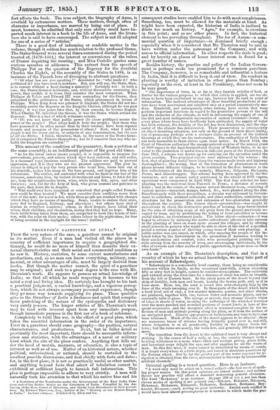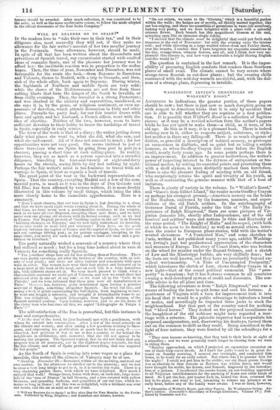THORNTON'S GAZETTEER OP INDIA. * Facest the very nature of the
case, a gazetteer cannot be original in its matter. Even if a man had visited all the places in a country of sufficient importance to require a geographical dic- tionary, he could do no more of himself than describe their ex- ternal characteristics and their social and commercial condition as he saw it. History, statistics, to some extent manufactures and productions, and, as no man can know everything, military, com- mercial, or other advantages of site, must be largely derived from books. But though the matter cannot, the spirit of a gazetteer may be original ; and such to a great degree is the ease with Mr. Thornton's work. He appears to possess an actual knowledge of India ; so that all which he reads respecting it becomes to his mind a real and livinr,° idea. He certainly has brought to his task a practical judgment, a varied knowledge, and a vigorous percep- tion, which do not always accompany personal experience, though they go some way towards supplying its place. These qualities give to the Gazetteer of India a freshness and spirit that compila- tions partaking of the nature of the cycloptedia and dictionary very rarely possess. The longer articles of Mr. Thornton's work may be read with interest apart from any immediate purpose, though immediate purpose is the first use of a book of reference.
Completely to fulfil this use, is the effect of a good plan, which takes the essential information in the order of its importance. First in a gazetteer should come geography—the position, natural characteristics, and productions. Next, but in fuller detail as practically the most important, there should be mercantile inform- ation and statistics, with the advantages of a naval or military kind which the site of the place confers. Anything that falls un- der the head of morals, manners, or education, is also a topic of interest as well as of use. Matter of an historical nature, whether political, ecclesiastical, or national, should be curtailed to the smallest possible dimensions, and deal chiefly with facts and dates ; fur, in the first place, it is not so practically useful as other matter, and anything beyond facts that admit of tabulation cannot be exhibited at sufficient length to furnish full information. This plan is perhaps impossible to adhere to very strictly. A man will naturally turn his attention to that which his native bias and his
• A Gazetteer of the Territories under the Government of the East India Com- pany nod of the Native States on the Continent of India. Compiled by the Au- I too ity el the Hon. Court of Directors, and chiefly from Documents in their posses- sion. By Edward Thornton. Esq., Author of the " History of the British Empire Ii, Italia.' In lour ■olutuci.. Published by Allen and Cu. consequent studies have enabled him to do with most completeness. Something, too, must be allowed for the materials at hand. As might have been expected, the historian of India is inclined to dilate too much on history. "Agra," for example is overdone in this point; and so are other places. In fact, le historical element is too pervading throughout. The tea of Assam—a com- mercial question of importance—is dismissed briefly enough ; especially when it is considered that Mr. Thornton may be said to have written under the patronage of the Company, and with access to official information. In other respects the scale is good; and by brevity on places of lesser interest room is found for a great number of names. Besides history, the practice and policy of the Indian Govern- ment is perhaps made too prominent for a common gazetteer. The Company, however, is so remarkable and influential a feature in India, that it is difficult to keep it out of view. Its conduct in planting is worthy of imitation in other places than Bombay ; especially as the cost, at least in the Presidency, does not seem to be very great. " The importance of trees, in so far as they furnish articles of food, or timber for the various purposes to which that article is applied, are too ob- vious to have been overlooked in any age, however low its rank in point of information. The indirect advantages of those beautiful productions of na- ture have been ascertained and admitted only at a period comparatively mo- dern. Humboldt, and subsequently other writers, have shown that trees perform important functions in regard to the productive powers of the soil and the character of the climate, as well in influencing the supply of one of the first and most indispensable necessaries of animal existence—water. In every place where trees have heedlessly been extirpated, the supply of water has been reduced, the fertility of the soil has been diminished, and the cha- racter of the climate has deteriorated. Their preservation is consequently an object deserving attention, not only on the ground of their direct utility, but as possessing perhaps even a stronger claim on account of the indirect blessings of which they are the instruments. The authorities of India have not been insensible to these claims upon their notice. In March 1844, the Court of Directors authorized the unappropriated surplus of the annual grant of 5000 rupees to the Agri-bortieultural Society of Western India, to be de- voted to the plantation of useful trees in different parts of the Presidency. In June 1845, a scheme was drawn up for carrying out the operation under the above sanction. Two principal objects were embraced by the scheme : the first, that of planting useful trees along the various made roads and highway thoroughfares; the second, that of the formation of plantations in waste places around different villages, to be restricted in the first instance to the five collectorates of the Deccan,—namely, Dharwar, Belgaum, Sholapore, Poona, and Ahmednuggur. The scheme having been approved by the Go- vernment, and an annual outlay sanctioned to the extent of 4000 rupees, operations were commenced in April 1846. The first line selected for tree- planting was the mail-road from Penwell to Poona, a distance of seventy miles ; and in the course of the season several thousand trees, consisting of various species—tamarind, mango, babool, &c., were planted along the line. Simultaneously with these proceedings, a circular was addressed by Govern- ment to collectors, assistant-collectors, and other authorities, containing in- structions for the preservation and extension of tree-plantation generally throughout the country. The former object—preservation—was sought by endeavours to check the destructive practice of burning large forest-timber for the sake of obtaining crops of dry grain from the ground previously oc- cupied by trees, and by prohibiting the felling of trees calculated to become useful timber, on Government lands. The latter object—extension—it was hoped to advance by inducing the native subordinate officers to take interest in the planting of trees on waste spots around the villages, and by offering small rewards to persona who might be able to show at the end of a specified period a certain number of thriving young trees of their own planting. I public notice was also issued, in which, after assuring the people of the in- terest taken by the Government in the promotion of measures tending to their amelioration and comfort, rules were promulgated pointing out the evils arising from the scarcity of trees, and encouraging individuals, by the offer of rewards and other marks of public approbation, to plant trees on their own 4ands."
As an example of Mr. Thornton's description, and that in a country of which he has no actual knowledge, we may take part of his account of Bahawulpore.
" Bahawulpore is a remarkably level country, there being no considerable eminence within its limits, as the occasional sand-hills, seldom exceeding fifty or sixty feet in height, cannot be considered exceptions. The cultivable part extends along the river-line for a distance of about ten miles in breadth, from the left or Eastern bank. In the sandy parts of the desert beyond this strip of fertility, both men and beasts, leaving the beaten path, sink as if in loose snow. Here, too, the sand is raised into ever-changing hills by the force of the winds sweeping over it. In those parts of the desert which have a hard level soil of clay, a few stunted mimosas, acacias, and other shrubs, are produced, together with rue, various bitter and aromatic plants, and oc- casionally tufts of grass. The mirage or sirraub, that strange illusive vision of lakes or sheets of water, mocking the sufferings of the wretched traveller over the more parched and scorched portions of desert lands, is here of fre- quent occurrence, and the deceptive effect is rendered complete by the re- flection of men and animals passing along the plain, as if from the surface of an unrippled pool. Illusive appearances of battlements and turrets have also been witnessed. Much of the soil of the desert appears to be alluvial : there are numerous traces of streams having formerly passed over it, and still, where irrigation is at all practicable, fertility in the clayey tracts fol- lows; but the rains are scanty, the wells few, aud generally 100 feet deep or more. "The transition from the desert to the cultivated tract is very abrupt and striking. In the course of half a mile, or less, the country changes nom a howling wilderness to a scene where thick and verdant groves, green fields, and luxuriant crops delight the eye, and offer supplies for all the wants of man. In this fine tract, if water cannot be distributed by means of canals, it is found everywhere at a little depth, and raised in abundant quantities by the Persian wheeL But by for the greater part of the water required for ir- rigation is obtained from the river, and conducted to the crops by innumerable artificial channels."
Oriental spelling is a vexed question. Here is an instance.
"A word only need be added on a vexed subject—the best mode of spell- ing proper names. On this point opinions are almost endless ; and neither theory nor practice will afford a standard demanding general obedieuce. The word 'Beekaneer' is an instance. At page 298 of vol. i. not less than eleven modes of spelling it are pointed out,—Bikuner, Bhicaner, Bikaneer, Biekaneer, Bickanere, Bikkaneir, Bliikanere, Beekaneer, Beekaner, Bey- kaneer, Bicanere,—each resting on good authority. Amidst such conflict it would have been almost presumptuous to d,termine to which mode the pre-
ference should be awarded. After much reflection, it was considered to be the safer, as well as the more unobtrusive course, to follow the mode adopted in the official documents of the East India Company."



































 Previous page
Previous page